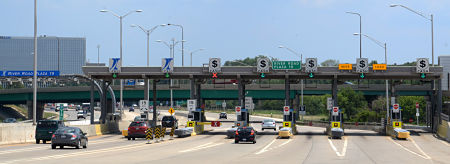Raimondo signs RI truck tolls plan into law
Rhode Island Gov. Gina Raimondo signed her toll-funded bridge-repair plan into law last week, declaring victory in a high-pitched legislative battle that has dominated state politics for the past nine months, according to a report on WPRI television.
Raimondo signed the bill shortly after the 38-member Senate approved the legislation on a 25-12 vote, less than 24 hours after the House granted its assent. Six Democrats defected from their leader, Senate President M. Teresa Paiva Weed, to vote against the bill, joining all five Republicans and one independent in opposition.
Thanking lawmakers who gathered in the State Room for the signing ceremony, Raimondo acknowledged it was “not an easy vote, but you did it.”
House Speaker Nicholas Mattiello, on hand for the signing ceremony, described the infrastructure-funding plan as “a big deal” for Rhode Island that he expects will help the state attract businesses over the long term by fixing roads and bridges.
Mattiello also dealt swiftly with three lawmakers who bucked him and voted against the toll legislation: Reps. Robert Phillips, Ray Hull and Joseph Solomon were all stripped of key committee assignments last Thursday.
During the more than two-hour Senate debate earlier in the day, Finance Committee Chairman Dan DaPonte, D-East Providence, made the case for why Democratic legislative leaders backed the bill, saying it represented an effort to tackle a serious problem that he described as bad for the economy and a danger to motorists.
“This problem that we’re dealing with today has been five decades in the making,” DaPonte said, describing the R.I. Department of Transportation’s past as “a disaster.”
Opponents led by newly elected Sen. John Pagliarini, R-Tiverton, echoed criticisms made during the House debate. He signaled out what he argued are a number of problems with the legislative language in the bill, and said he saw a variety of ways it will be vulnerable to challenges in court.
“We firmly believe we need to fix infrastructure,” said Senate Minority Leader Dennis Algiere, R-Westerly, who flipped from supporting tolls in 2015 to opposing them on last week. “But we just don’t agree on getting the revenue through tolls. We think it sends a bad message.”
Sen. Frank Lombardi, D-Cranston, suggested much of the opposition to tolling stems from voters’ general distrust of state leaders, particularly in the wake of the 38 Studios debacle. He argued tough decisions by lawmakers will help overcome “the conspiracy out there that we are all out to ruin the state of Rhode Island.”
The proposed legislation, dubbed RhodeWorks, would fund a multiyear surge of bridge repairs through two mechanisms: borrowing $300 million against future federal highway funding, as well as refinancing old borrowing to yield an additional $120 million; and imposing a new toll on large commercial trucks, projected to yield $45 million a year.
The Senate Fiscal Office estimates the two initiatives would generate a net total of $543 million in new revenue for RIDOT between 2016 and 2020. The Raimondo administration says the plan will save money over the long term by avoiding more costly repairs down the road.
Critics led by the trucking industry have charged the tolls would inflict unnecessary economic damage on Rhode Island’s economy, and warned of legal challenges over the constitutionality of the plan.
State officials expect to complete the borrowing transactions within the months. Tolling would proceed more slowly, with gantry construction not expected to begin until early 2017 and the first toll revenue not expected to be collected until late 2017.
The entire RhodeWorks plan is a $4.7-billion suite of infrastructure projects to be done over the next 10 years, including but not limited to the much-discussed bridge repairs. RIDOT Director Peter Alviti told reporters last month that his department has already drafted contracts that could be put out to bid as soon as the day after the legislation is signed.






